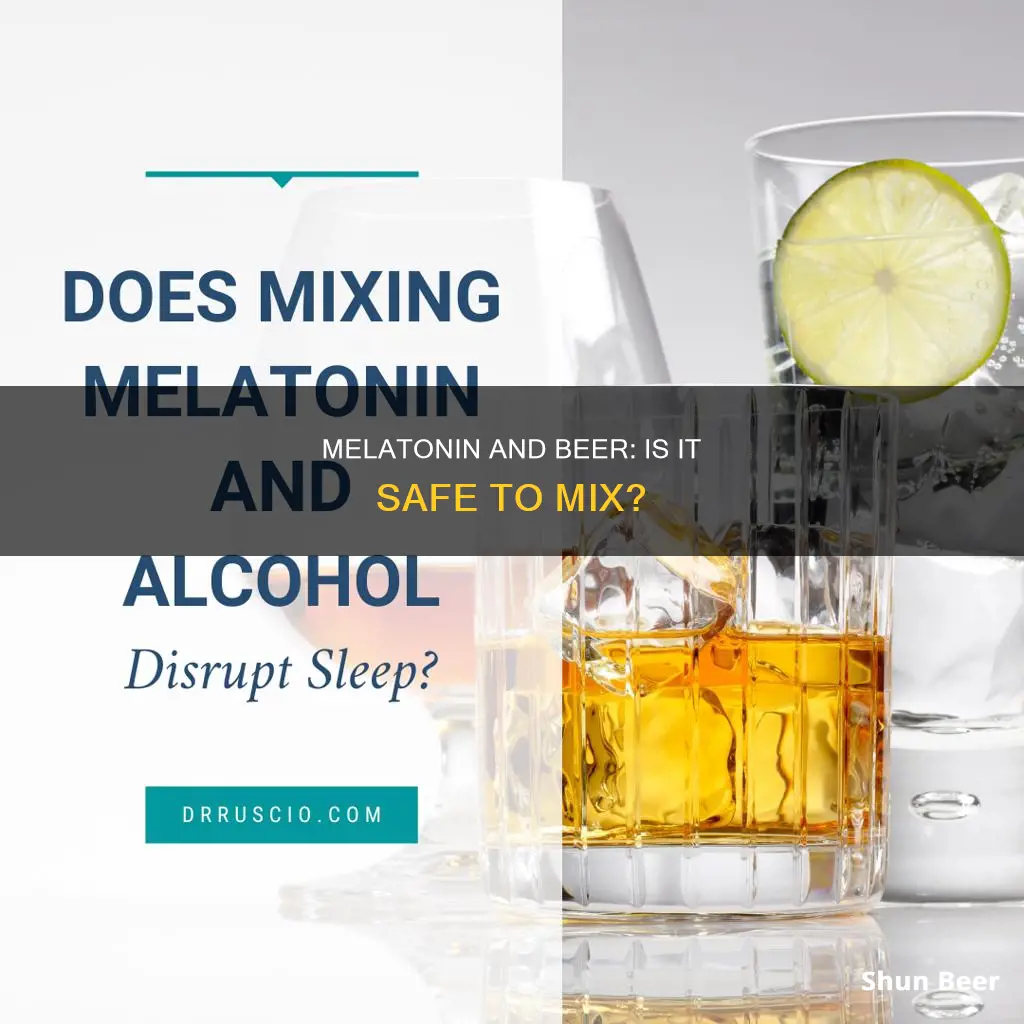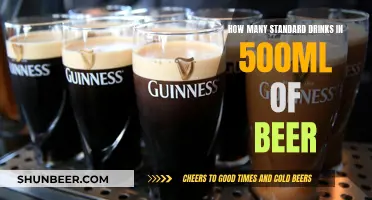
Melatonin is a hormone that helps regulate the body's sleep-wake cycle, also known as the circadian rhythm. It is produced naturally in the brain and is also available as an over-the-counter supplement to aid sleep. While melatonin on its own is generally considered safe, mixing it with alcohol is not recommended and can have potentially dangerous side effects.
Alcohol interferes with the effectiveness of medications and supplements, including melatonin. Drinking alcohol with melatonin may lead to negative side effects such as dizziness, increased anxiety, and breathing problems. It can also affect the liver's ability to produce certain enzymes, leading to complications such as flushing, swelling in the feet and ankles, and an increased heartbeat.
Additionally, alcohol disrupts sleep patterns, which can further reduce the effectiveness of melatonin. Alcohol reduces the amount of REM sleep, the deepest stage of sleep, and can cause disturbances throughout the night, resulting in poor sleep quality.
Therefore, it is advised to avoid mixing melatonin and alcohol to prevent potential health risks and sleep disturbances.
| Characteristics | Values |
|---|---|
| Should you take melatonin after drinking beer? | No |
| Why? | Alcohol interferes with the effectiveness of melatonin |
| What are the risks of taking melatonin with alcohol? | Increased drowsiness, dizziness, anxiety, trouble concentrating, raised blood pressure, breathing problems, falling, car crashes, accidental injuries, etc. |
| How long should you wait after drinking to take melatonin? | 2-3 hours |
What You'll Learn

The dangers of mixing melatonin and alcohol
Mixing melatonin and alcohol is not recommended due to the potential side effects and health risks. Melatonin is a hormone that helps regulate sleep and is available as an over-the-counter supplement. While melatonin on its own is considered safe, combining it with alcohol can lead to negative consequences.
Firstly, alcohol can interfere with the effectiveness of melatonin. It may weaken or strengthen its effects, making it difficult to predict how melatonin will work when mixed with alcohol. Alcohol also disrupts sleep patterns, which can further reduce melatonin's ability to promote restful sleep.
Secondly, there are potential side effects associated with mixing melatonin and alcohol. These include increased drowsiness, dizziness, and anxiety. The combination may also affect your liver's ability to produce certain enzymes, leading to possible complications such as flushing, swelling in the feet and ankles, rapid heartbeat, and concentration problems. The extreme drowsiness caused by the combination can be dangerous, especially when driving or operating machinery.
Additionally, alcohol can negatively impact your sleep cycles. While it may initially make you feel sleepy, it can prevent you from getting deep, restorative sleep. This disruption can be further exacerbated when mixed with melatonin, resulting in poor sleep quality.
Moreover, the combination of alcohol and melatonin can affect breathing, particularly for individuals with sleep apnea. Alcohol impacts the muscles surrounding the airways, which can lead to increased sleep problems.
In conclusion, while melatonin and alcohol are both commonly used to aid sleep, mixing them can have dangerous consequences. It is essential to consult a healthcare professional before taking any supplements, especially when combined with alcohol, to ensure your safety and well-being.
Beer and Dental Surgery: What You Need to Know
You may want to see also

How alcohol affects your sleep
Alcohol can have a significant impact on your sleep, and not always in a good way. While a nightcap may help you feel relaxed and sleepy, it can also lead to a poor night's rest. Here's how:
Quality of Sleep
Alcohol can disrupt the quality of your sleep by reducing the time spent in the restorative rapid eye movement (REM) sleep stage. REM sleep is crucial for healing, memory retention, and feeling rested. The amount of alcohol consumed and individual factors such as age, gender, and body composition can all influence the quality of sleep. Even a small serving of alcohol (under two drinks for men and under one for women) can decrease sleep quality by 9.3%. A large serving (more than two drinks for men and more than one for women) can decrease it by 39.2%.
Dreams
Alcohol's suppression of REM sleep can lead to more vivid or stressful dreams. Uncomfortable dreams may cause you to wake up more frequently throughout the night, and you are also more likely to remember your dreams.
Sleep Duration and Fragmentation
Alcohol can lead to shorter sleep duration and a more fragmented sleep pattern. You may fall asleep quickly but have trouble staying asleep comfortably. As the night progresses, you will experience more slow-wave sleep (deep sleep) than REM sleep.
Urination
Alcohol increases urine output, leading to more frequent trips to the bathroom throughout the night.
Sleep Disorders
Alcohol can worsen symptoms of existing sleep disorders, such as sleep apnea. It relaxes the muscles in the throat, creating more resistance when breathing and increasing the likelihood of airway collapse during sleep. Drinking alcohol before bed can worsen snoring and increase the risk of sleep apnea by 25%.
Circadian Rhythm Disruptions
Alcohol use and dependence can interfere with circadian rhythms, the biological patterns that operate on a 24-hour clock. Alcohol may decrease the body's sensitivity to cues like daylight and darkness, which are essential for regulating the sleep-wake cycle. As a result, you may feel alert when you want to sleep and sleepy when you want to be awake.
Insomnia
Alcohol consumed before bedtime can increase the risk of insomnia, a common sleep disorder characterised by difficulty falling or staying asleep. Insomnia can lead to excessive daytime sleepiness, creating a cycle of reliance on alcohol to induce sleep and stimulants like caffeine to stay awake during the day.
Interactions with Sleep-Inducing Medications
If you've been drinking, it's recommended to refrain from taking sleep-inducing medications such as Ambien, Benadryl, Tylenol PM, and even melatonin. Combining alcohol with these substances can be dangerous as alcohol is a central nervous system depressant.
Beer and Anemia: Is It Safe to Drink?
You may want to see also

Side effects of taking melatonin and alcohol
Melatonin is a natural sleep aid that helps regulate sleep cycles. While melatonin is generally safe, mixing it with alcohol can have unpredictable and dangerous effects on your body and health.
Combining melatonin and alcohol can cause several side effects, including:
- Increased drowsiness and dizziness: Both substances have sedative effects, which can lead to excessive drowsiness, impaired coordination, and an increased risk of accidents or falls.
- Sleep disturbances: While melatonin promotes sleep, alcohol can disrupt sleep patterns, resulting in poor sleep quality.
- Increased anxiety and irritability: This can lead to feelings of irritability or raised blood pressure.
- Liver stress: As the liver is responsible for processing both alcohol and melatonin, consuming them together may place additional stress on the liver, potentially exacerbating pre-existing liver conditions or increasing the risk of liver damage.
- Impaired judgment and cognitive function: Alcohol impairs judgment, decision-making, and cognitive function, and combining it with melatonin may exacerbate these effects, increasing the risk of accidents and poor decisions.
- Fuzzy thinking: This can make it difficult to focus or think clearly.
- Physical side effects: These can include flushing in the face and upper body, swelling of the feet and ankles, an abnormally fast heartbeat, and feeling abnormally cold or shivering.
- Breathing problems: Alcohol can impact the muscles surrounding the airways, affecting breathing and potentially causing sleep problems, especially for those with sleep apnea.
- Interactions with medications: Both substances can interact with various medications, increasing the risk of harmful interactions, especially for those taking medications for sleep disorders, anxiety, depression, or related conditions.
Beer and Blood in Stool: What's the Connection?
You may want to see also

Why you shouldn't take melatonin and alcohol together
Melatonin is a hormone that the body produces in response to darkness, signalling that it is time for sleep. It is also available as an over-the-counter supplement to aid sleep. Alcohol, on the other hand, is a sedative that can make you feel sleepy but interferes with your sleep cycle, causing you to wake up more frequently throughout the night.
While both substances can make you feel drowsy, taking them together can lead to negative side effects, and it is not recommended to combine them. Here are some reasons why you should avoid taking melatonin and alcohol together:
Increased drowsiness and risk of accidents
The combination of melatonin and alcohol can cause extreme drowsiness, which can make it dangerous to drive or operate machinery. This super-drowsy effect increases the risk of accidents and losing consciousness.
Dizziness
Together, alcohol and melatonin can cause dizziness, which can make activities like driving or even walking dangerous.
Increased anxiety
Consuming alcohol and melatonin together can lead to increased anxiety and irritability. It can also raise your blood pressure, which is potentially dangerous.
Liver complications
The combination of alcohol and melatonin can affect your liver's ability to produce certain enzymes. This can lead to side effects such as flushing, swelling in the feet and ankles, and an abnormally fast heartbeat.
Poor sleep quality
Alcohol disrupts your sleep-wake cycle and reduces the amount of REM sleep you get, leading to poor sleep quality. Even though melatonin is meant to aid sleep, taking it with alcohol may reduce its effectiveness, resulting in a restless night.
Breathing problems
Alcohol can impact the muscles surrounding your airways, affecting your breathing. This can cause increased sleep problems, especially if you have sleep apnea.
Other side effects
Other potential side effects of combining alcohol and melatonin include fuzzy thinking, trouble concentrating, and feeling abnormally cold or shivering.
Beer Temperature: Cold, Warm, and Safe to Drink?
You may want to see also

What to do if you've mixed melatonin and alcohol
Mixing alcohol and melatonin is not recommended due to the potential for negative side effects and health complications. If you've mixed melatonin and alcohol, here are some steps you should take:
- Assess your condition: If you experience any negative side effects such as dizziness, increased anxiety, breathing problems, or difficulty walking, seek medical attention immediately. These side effects can be dangerous and put you at risk of accidents or losing consciousness.
- Drink water: Alcohol can dehydrate the body, so it's important to drink plenty of water to help flush out the toxins and rehydrate.
- Rest: If possible, take time to rest and avoid any activities that require focus or concentration. The combination of alcohol and melatonin can impair your thinking and make it difficult to perform certain tasks.
- See a doctor: If you experience any severe or persistent side effects, or if you have underlying health conditions, consult a healthcare professional. They can assess your condition and provide personalized advice and treatment.
- Avoid mixing in the future: To avoid potential health risks and negative side effects, it's best to avoid mixing alcohol and melatonin. Wait for a long time after drinking alcohol before taking melatonin, and always follow the advice of your doctor or healthcare provider.
It is important to note that the effects of mixing alcohol and melatonin can vary depending on individual factors such as metabolism, the amount of alcohol consumed, and the dosage of melatonin. Always speak with your doctor before taking any supplements, and follow their recommendations for safe use.
Beer and Diflucan: Is It Safe to Mix?
You may want to see also
Frequently asked questions
No, it is not safe to take melatonin after drinking beer. Alcohol interferes with the effectiveness of supplements and medications, and melatonin is no exception. Alcohol can either weaken or strengthen the effects of melatonin, and the combination may lead to serious complications.
Some of the side effects of taking melatonin after drinking beer include dizziness, drowsiness, increased anxiety, and trouble breathing. The combination may also affect your liver and cause changes in blood pressure.
It is recommended to wait at least 2-3 hours after drinking beer before taking melatonin. This will help ensure that the alcohol has cleared your system and reduce the risk of negative side effects.
Yes, instead of relying on melatonin, you can try improving your "sleep hygiene." This includes practices such as using blackout shades in your bedroom, setting the thermostat to a cooler temperature, and putting away electronic devices at least an hour before bed.







